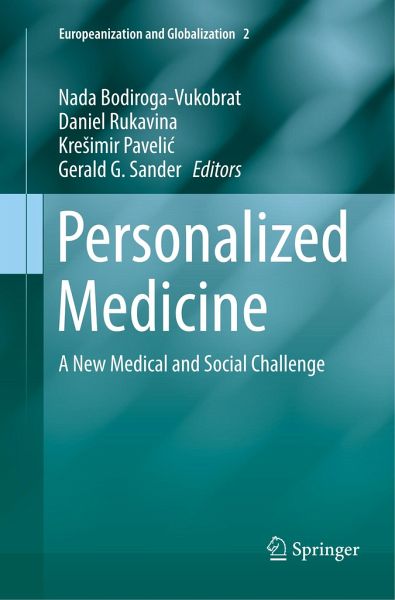
Personalized Medicine
A New Medical and Social Challenge
Herausgegeben: Bodiroga-Vukobrat, Nada; Rukavina, Daniel; Pavelic, Kresimir; Sander, Gerald G.
Versandkostenfrei!
Versandfertig in 6-10 Tagen
76,99 €
inkl. MwSt.

PAYBACK Punkte
38 °P sammeln!
This book offers comprehensive coverage of the various aspects of personalized medicine as an original approach to classifying, understanding, treating and preventing disease based on individual biological differences. In the introductory section, it defines personalized medicine as a way toward new medical practices and addresses the question: What can personalized medicine offer citizens, medical professionals, reimbursement bodies and stakeholders? Subsequent chapters discuss the technological aspects of personalized medicine: data collection, comprehensive integration and handling of data,...
This book offers comprehensive coverage of the various aspects of personalized medicine as an original approach to classifying, understanding, treating and preventing disease based on individual biological differences. In the introductory section, it defines personalized medicine as a way toward new medical practices and addresses the question: What can personalized medicine offer citizens, medical professionals, reimbursement bodies and stakeholders? Subsequent chapters discuss the technological aspects of personalized medicine: data collection, comprehensive integration and handling of data, together with key enabling factors in developing the requisite technological support for personalized medicine. Lastly, the book explores the main issues shaping the implementation and development of personalized medicine - education, stakeholder participation, infrastructure, a new approach to the classification of disease and medical tests, regulatory frameworks, and new reimbursementmodels- together with ethical, legal and social issues. Ultimately, the book calls for interdisciplinarity and a radical change in the way we approach the health and wellbeing of individuals.
Target groups are medical doctors and researchers in the field of biomedicine, as well as experts from the social sciences dealing with legal, economic and social aspects of health system issues in general. Though the book will primarily benefit these groups of professional experts, its content will also appeal to a far wider readership, as it deals with a paradigm shift in one of society's main pillars - the health system.
Target groups are medical doctors and researchers in the field of biomedicine, as well as experts from the social sciences dealing with legal, economic and social aspects of health system issues in general. Though the book will primarily benefit these groups of professional experts, its content will also appeal to a far wider readership, as it deals with a paradigm shift in one of society's main pillars - the health system.












